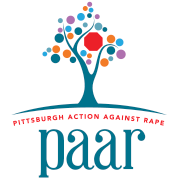PAAR Prevention Initiatives in Schools and Colleges
In Colleges
Southwestern Pennsylvania is home to over a dozen colleges and universities and tens of thousands of university students. Recent national attention on the subject of sexual violence on college campuses has brought this persistent problem to the forefront of mainstream conversation. Pittsburgh Action Against Rape (PAAR) is actively working with many of the colleges and universities in Allegheny County, and tailors an education, awareness, and prevention approach to fit the needs and culture of each institution. Some examples of their programming include:
- Resident Advisor Education: Trains resident hall advisors to both respond to a disclosure of sexual violence and to take steps to prevent violence before it happens.
- Campus presentations: Presents on bystander engagement and intervention, co-hosts Mocktail events with students and supports Take Back the Night events.
- Public Service Announcement (PSA): Engages students in creating campaigns that address sexual assault on campus. Posters focus on obtaining consent and supporting survivors.
- Community Readiness Assessment Model (CRAM): Utilizes this nationally recognized tool, recommended by the White House Task Force to Protect Students From Sexual Assault, to assist universities in assessing strengths and weaknesses in prevention efforts and to develop tailored short and long range prevention plans.
Programming can be adapted to address the unique needs and culture of each campus.
In Schools
Pittsburgh Action Against Rape offers research-based primary prevention programs.
Since research-based programs are not available for every audience and PAAR has addressed this by developing programs using evaluation tools that demonstrate program effectiveness. PAAR’s programs are tailored to specific audiences in an effort to meet community requests.
Programs include:
Parents in the Know
Engages parents in preventing child sexual abuse. “Parents in the Know” builds skills in parents that promote safe and respectful behaviors, recognize questionable behaviors in adults, how to intervene when witnessing those questionable behaviors and promote discussion between parents and children on healthy relationships and sexuality.
Promoting Positive Social Norms to End Sexual Violence (Middle and High schools)
This program for High schools promotes a healthy and respectful school climate by preventing sexually aggressive behaviors, including: 1) inappropriate name-calling, 2) sexual commenting about students’ bodies, 3) spreading of false sexual rumors, 4) sexual gossip about other students, 5) sending sexual picture texts, 6) unwanted harassing texts among students, and 7) unwanted touching among students, 8) coercing another student for sexual activity. With the exception of sexual gossip, the self-reported perpetration and victimization rates of sexual harassment decreased over time. In addition students were more able to identify and take action against sexual harassment.
Building Healthy Relationships, and sexual harassment prevention programs are also available.
PAAR uses the Community Readiness Model (CRM), developed by the Tri-Ethnic Center at Colorado State University, to measure a community’s readiness to adopt primary prevention strategies. Baseline data is gathered from a variety of stakeholders in the community; activities are tailored to help that school or community to take the next steps to change its culture to prevent sexual violence.

